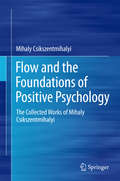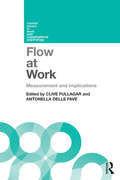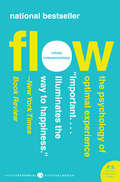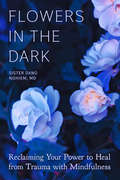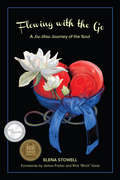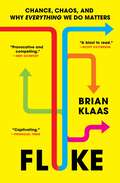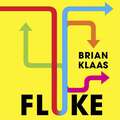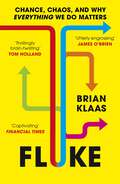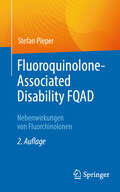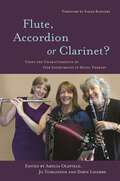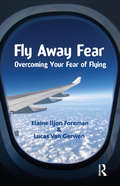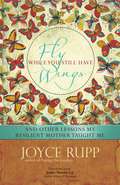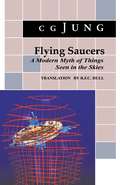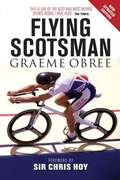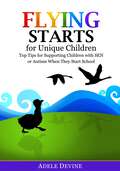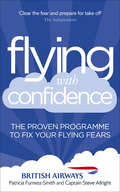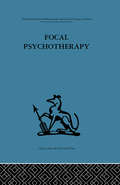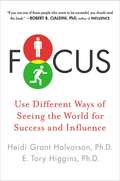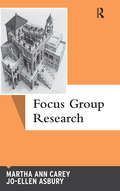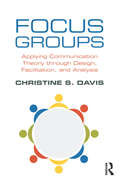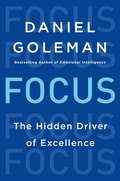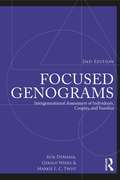- Table View
- List View
Flow and the Foundations of Positive Psychology
by Mihaly CsikszentmihalyiThe second volume in the collected works of Mihaly Csikszentmihalyi covers about thirty years of Csikszentmihalyi's work on three main and interconnected areas of study: attention, flow and positive psychology. Describing attention as psychic energy and in the footsteps of William James, Csikszentmihalyi explores the allocation of attention, the when and where and the amount of attention humans pay to tasks and the role of attention in creating 'experiences', or ordered patterns of information. Taking into account information processing theories and attempts at quantifying people's investment, the chapters deal with such topics as time budgets and the development and use of the Experience Sampling Method of collecting data on attention in everyday life Following the chapters on attention and reflecting Csikszentmihalyi's branching out into sociology and anthropology, there are chapters on the topic of adult play and leisure and connected to that, on flow, a concept formulated and developed by Csikszentmihalyi. Flow has become a popular concept in business and management around the world and research on the concept continues to flourish. Finally, this volume contains articles that stem from Csikszentmihalyi's connection with Martin Seligman; they deal with concepts and theories, as well as with the development and short history, of the field and the "movement" of positive psychology.
Flow at Work: Measurement and Implications
by Antonella Delle Fave Clive FullagarFlow can be defined as the experience of being fully engaged with the task at hand, unburdened by outside concerns or worries. Flow is an enjoyable state of effortless attention, complete absorption, and focussed energy. The pivotal role of flow in fostering good performance and high productivity led psychologists to study the features and outcomes of this experience in the workplace, in order to ascertain the impact of flow on individual and organizational well-being, and to identify strategies to increase the workers’ opportunities for flow in job tasks. This ground-breaking new collection is the first book to provide a comprehensive understanding of flow in the workplace that includes a contribution from the founding father of flow research, Mihaly Csikszentmihalyi. On a conceptual level, this book clarifies the features and structure of flow experience; and provides research-based evidence of how flow can be measured in the workplace on an empirical level, as well as exploring how it impacts on motivation, productivity, and well-being. By virtue of its rigorous but also practical approach, the book represents a useful tool for both scientists and practitioners. The collection addresses a number of key issues, including: Core components of how the idea of flow differs from experience in the work context Organizational and task-related conditions fostering flow at work How flow can be measured in the workplace The organizational and personal implications of flow The relationship between task features and flow opportunities at work Featuring contributions from some of the most active researchers in the field, Flow at Work: Measurement and Implications is an important book in an emerging field of study. The concept of flow has enormous implications for organizations as well as the individual, and this volume will be of interest to all students and researchers in organizational/occupational psychology and positive psychology, as well as practitioners and consultants with an interest in employee motivation and well-being.
Flow: The Psychology of Optimal Experience (Harper Perennial Modern Classics)
by Mihaly CsikszentmihalyiPsychologist Mihaly Csikszentmihalyi's famous investigations of "optimal experience" have revealed that what makes an experience genuinely satisfying is a state of consciousness called flow. During flow, people typically experience deep enjoyment, creativity, and a total involvement with life. In this new edition of his groundbreaking classic work, Csikszentmihalyi demonstrates the ways this positive state can be controlled, not just left to chance. Flow: The Psychology of Optimal Experience teaches how, by ordering the information that enters our consciousness, we can discover true happiness and greatly improve the quality of our lives.
Flowers in the Dark: Reclaiming Your Power to Heal from Trauma with Mindfulness
by Sister Dang NghiemLearn the accessible and deeply compassionate practices for healing trauma, known as the Five Strengths of applied Zen Buddhism. More than a philosophy, these body-based practices are backed by modern neuroscience research, and they can be applied by anyone suffering from trauma to begin experiencing relief.Mindfulness teacher Sister Dang Nghiem, MD, is an inspiration for anyone who has ever suffered from abuse, life-changing loss, severe illness, or the aftermath of war. In Flowers in the Dark, she brings together her lived experience as a survivor, certified MD, and ordained Buddhist teacher to offer a body-based, practical approach to healing from life's most difficult and painful experiences. Offering insights from Buddhist psychology and simple somatic practices for tapping into our Five Strengths--our inner faculties of self-trust, diligence, mindfulness, concentration, and insight--Sister Dang Nghiem's approach to trauma is radically accessible; it begins with awareness of our breathing. With each chapter containing a progression of guided reflections an exercises, this book can be read as an adjunct to therapy and a helpful guide for moving through trauma in the body. With the practice of mindfulness, we can access our strength as survivors and our joy in being alive.
Flowing with the Go
by Elena StowellWinner of three awards---a 2012 eLit Award, a 2013 Indie Next Generation Award, and a 2013 Living Now award---"Flowing with the Go-A Jiu-Jitsu Journey of the Soul" is the story of one woman's path through grief. For what seemed like a lifetime and probably was, Elena Stowell wandered aimlessly in a personal prison of self-doubt and lack of purpose after her fifteen-year-old daughter Carly died suddenly before her eyes. By some combination of miracle and necessity, she walked into a Seattle area Brazilian Jiu-Jitsu gym and rolled for the first time in her life. Through that experience and others that followed, Elena discovered the tenets of the martial art form and healing were the same. With a ripping raw honesty and refreshing balance of humor and introspection, Elena's story reminds us to never stop panning for the gold within ourselves.
Fluke: Chance, Chaos, and Why Everything We Do Matters
by Brian KlaasWant to know what chaos theory can teach us about human events? In the perspective-altering tradition of Malcolm Gladwell&’s The Tipping Point and Nassim Nicholas Taleb&’s The Black Swan comes a provocative challenge to how we think our world works—and why small, chance events can divert our lives and change everything, by social scientist and Atlantic writer Brian Klaas.If you could rewind your life to the very beginning and then press play, would everything turn out the same? Or could making an accidental phone call or missing an exit off the highway change not just your life, but history itself? And would you remain blind to the radically different possible world you unknowingly left behind? In Fluke, myth-shattering social scientist Brian Klaas dives deeply into the phenomenon of random chance and the chaos it can sow, taking aim at most people&’s neat and tidy storybook version of reality. The book&’s argument is that we willfully ignore a bewildering truth: but for a few small changes, our lives—and our societies—could be radically different. Offering an entirely new lens, Fluke explores how our world really works, driven by strange interactions and apparently random events. How did one couple&’s vacation cause 100,000 people to die? Does our decision to hit the snooze button in the morning radically alter the trajectory of our lives? And has the evolution of humans been inevitable, or are we simply the product of a series of freak accidents? Drawing on social science, chaos theory, history, evolutionary biology, and philosophy, Klaas provides a brilliantly fresh look at why things happen—all while providing mind-bending lessons on how we can live smarter, be happier, and lead more fulfilling lives.
Fluke: Chance, Chaos, and Why Everything We Do Matters
by Dr Brian KlaasWhy small, chance events can divert our lives and change how we think our world works.If you could rewind your life to the very beginning and then press play, would everything turn out the same? Or could making an accidental phone call or missing an exit off the highway change not just your life, but history itself? And would you remain blind to the radically different possible world you unknowingly left behind?In Fluke, myth-shattering social scientist Brian Klaas dives deeply into the phenomenon of random chance and the chaos it can sow, taking aim at most people's neat and tidy storybook version of reality. The book's argument is that we willfully ignore a bewildering truth: but for a few small changes, our lives - and our societies - could be radically different. Offering an entirely new lens, Fluke explores how our world really works, driven by strange interactions and apparently random events. How did one couple's vacation cause 100,000 people to die? Does our decision to hit the snooze button in the morning radically alter the trajectory of our lives? And has the evolution of humans been inevitable, or are we simply the product of a series of freak accidents? Drawing on social science, chaos theory, history, evolutionary biology, and philosophy, Klaas provides a brilliantly fresh look at why things happen - all while providing mind-bending lessons on how we can live smarter, be happier, and lead more fulfilling lives.Praise for Brian Klaas:'Illuminating' Adam Grant'Passionate, insightful, and occasionally jaw-dropping' Peter Frankopan'A brilliant exploration' Dan Snow'You'll never look at the world the same way again' Ian Dunt(P) 2024 Hodder & Stoughton Limited
Fluke: Chance, Chaos, and Why Everything We Do Matters
by Dr Brian Klaas'Consistently gripping - dazzling in its sweep and thrillingly brain-twisting in its arguments' Tom HollandA provocative new vision of how our world really works - and why chance determines everything. In Fluke, myth-shattering social scientist Brian Klaas deep-dives into the phenomenon of randomness, unpicking our neat and tidy storybook version of events to reveal a reality far wilder and more fascinating than we have dared to consider. The bewildering truth is that but for a few incidental changes, our lives - and our societies - would be radically different.Offering an entirely new perspective, Fluke explores how our world really works, driven by strange interactions and random events. How much difference does our decision to hit the snooze button make? Did one couple's vacation really change the course of the twentieth century? What are the smallest accidents that have tilted the course of history itself? The mind-bending lessons of this phenomenon challenge our beliefs about the very workings of the world. From the evolution of human biology and natural disasters to the impact of global events on supply chain disruptions, every detail matters because of the web of connectivity that envelops us. So what if, by exploding our illusion of control, we can make better decisions and live happy, fulfilling lives?
Fluoroquinolone-Associated Disability FQAD: Nebenwirkungen von Fluorchinolonen
by Stefan PieperDieses Buch hilft das Krankheitsbild FQAD einfach zu diagnostizieren und mit FQAD-Patienten besser und adäquater umzugehen: Ein Muss für Ärztinnen und Ärzte der Allgemeinmedizin, Orthopädie, Neurologie und Psychiatrie sowie Therapieberufe. Im Mittelpunkt stehen Pathogenese, Diagnostik und die (begrenzten) therapeutischen Möglichkeiten, die aus der Sicht des Autors Aussicht auf Erfolg haben. FAQD-Diagnosekriterien helfen zudem, das neue Krankheitsbild im Praxisalltag sicher und zeitsparend einzugrenzen. Individuelle Praxiserfahrungen des Autors mit inzwischen mehr als 1000 FQAD-Patienten ergänzen das Praxisbuch
Flute, Accordion or Clarinet?: Using the Characteristics of Our Instruments in Music Therapy
by John Preston Caroline Anderson Steve Lyons Susan Greenhalgh George Murray Amelia Oldfield Jo Tomlinson Philippa Derrington Stella Compton-Dickinson Philip Hughes Alex Street Tessa Watson Luke Annesley Annie Tyhurst Holly Mentzer Billy Davidson Trygve Aasgaard Henry Dunn Lisa Margetts Prodromos Stylianou Angela Harrison Katy Bell Nicky Haire Oonagh Jones Jonathan Poole Sharon Warnes Joanna Burley Shlomi Hason Penelope Birnstingl Susanna Crociani Paolo Pizziolo Emily Corke Grace Watts Spela Loti Knoll Sarah Rodgers Trisha Montague Dawn Loombe Caroline Long Colette Salkeld Helen Mottram Catrin Piears-Banton Mary-Clare Fearn Concetta Tomaino Veronica Austin Joseph Piccinnini Catherine Warner Anita Vaz Anna Lockett Nathan Bettany Esther Mitchell Mike Gilroy Rivka GottliebMusic therapists are trained to use their first study instrument in clinical practice, yet existing literature focuses almost exclusively on the use of piano, basic percussion and voice. This illuminating book brings together international music therapists who use a diverse range of musical instruments in their clinical work: the clarinet, the piano accordion, the flute, the cello, the trumpet and flugelhorn, the bassoon, the violin, the viola, the harp, the guitar, lower brass instruments (the trombone and the euphonium), the oboe, the saxophone and bass instruments (double bass and bass guitar). Each therapist reflects on their relationship with their instrument and the ways in which they use it in therapeutic settings, discussing its advantages and disadvantages in a variety of clinical populations: children and adolescents, adults with learning disabilities, adults with mental health problems and older people. This will be essential reading for any music therapist or student music therapist who uses or is interested in using a musical instrument in their work, and will be of interest to other caring and healthcare professionals, teachers, musicians and carers wanting to learn more about instrumental music therapy.
Flute, Accordion or Clarinet?: Using the Characteristics of Our Instruments in Music Therapy
by Amelia Oldfield Jo Tomlinson Dawn LoombeMusic therapists are trained to use their first study instrument in clinical practice, yet existing literature focuses almost exclusively on the use of piano, basic percussion and voice.This illuminating book brings together international music therapists who use a diverse range of musical instruments in their clinical work: the clarinet, the piano accordion, the flute, the cello, the trumpet and flugelhorn, the bassoon, the violin, the viola, the harp, the guitar, lower brass instruments (the trombone and the euphonium), the oboe, the saxophone and bass instruments (double bass and bass guitar). Each therapist reflects on their relationship with their instrument and the ways in which they use it in therapeutic settings, discussing its advantages and disadvantages in a variety of clinical populations: children and adolescents, adults with learning disabilities, adults with mental health problems and older people.This will be essential reading for any music therapist or student music therapist who uses or is interested in using a musical instrument in their work, and will be of interest to other caring and healthcare professionals, teachers, musicians and carers wanting to learn more about instrumental music therapy.
Fly Away Fear: Overcoming your Fear of Flying (The Self-Help Series)
by Elaine Iljon ForemanResearch indicates about 35 of every 100 people develop a fear of flying at some point in their life. Almost everyone knows someone who has it. If you've ever mentioned to others that you aren't comfortable with air travel, you've probably already discovered just how common is the fear of flying. Fear of flying is a condition that merits proper attention, and which we are increasingly in a better position to deal with, particularly thanks to clinical research. We now know that fear of flying is similar to other phobias, and that it cannot be dismissed simply as fear of the unknown, and that telling someone to "pull yourself together" just isn't likely to be an effective way to deal with the problem. Gaining your freedom to expand your enjoyment of life is the purpose of this book. The book covers a number of areas, including valuable information about flying and everything to do with flying safety.
Fly While You Still Have Wings: And Other Lessons My Resilient Mother Taught Me
by Joyce RuppIn this heartfelt memoir about her mother Hilda's final years, Joyce Rupp shares the lessons her mother taught her, especially to "fly while you still have wings. " As a poor farmer's wife and the mother of eight living on rented land in Maryhill, Iowa, Hilda lived a life of hard labor and constant responsibility--from milking cows and raising chickens to keeping the farm's financial ledger. Rupp shows how the difficulties of her mother's early years and family life, including the loss of a twenty-three-year-old son, forged a resilience that guided her through the illnesses and losses she faced in later years. This affectionate profile of their relationship is, at the same time, an honest self-examination, as Rupp shares the ways she sometimes failed to listen to, accept, and understand her mother in her final years. Rupp begins each chapter with a meditative poem that captures the essence of each stage in the journey. Her unfailing candor and profound faith illumine this story of a mother and daughter with a universal spirit of hope, reconciliation, and peace.
Flying Saucers: A Modern Myth of Things Seen in the Sky (Routledge Classics)
by C.G. JungWritten in the late 1950s at the height of popular fascination with UFO's, Flying Saucers is the great psychologist's brilliantly prescient meditation on the phenomenon that gripped the world. A self-confessed sceptic in such matters, Jung was nevertheless intrigued, not so much by their reality or unreality, but by their psychic aspect. He saw flying saucers as a modern myth in the making, to be passed down the generations just as we have received such myths from our ancestors. In this wonderful and enlightening book Jung sees UFO's as 'visionary rumours', the centre of a quasi-religious cult and carriers of our technological and salvationist fantasies. 40 years later, with entire religions based on the writings of science fiction authors, it is remarkable to see just how right he has proved to be.
Flying Saucers: A Modern Myth of Things Seen in the Sky. (From Vols. 10 and 18, Collected Works) (Jung Extracts #2)
by C. G. Jung"In the threatening situation of the world today, when people are beginning to see that everything is at stake, the projection-creating fantasy soars beyond the realm of earthly organizations and powers into the heavens, into interstellar space, where the rulers of human fate, the gods, once had their abode in the planets.... Even people who would never have thought that a religious problem could be a serious matter that concerned them personally are beginning to ask themselves fundamental questions. Under these circumstances it would not be at all surprising if those sections of the community who ask themselves nothing were visited by `visions,' by a widespread myth seriously believed in by some and rejected as absurd by others."--C. G. Jung, in Flying Saucers ? Jung's primary concern in Flying Saucers is not with the reality or unreality of UFOs but with their psychic aspect. Rather than speculate about their possible nature and extraterrestrial origin as alleged spacecraft, he asks what it may signify that these phenomena, whether real or imagined, are seen in such numbers just at a time when humankind is menaced as never before in history. The UFOs represent, in Jung's phrase, "a modern myth."
Flying Scotsman: The Graeme Obree Story (Velo Press Ser.)
by Graeme ObreeThe record-breaking cyclist shares his battle with bipolar disorder: &“One of the best and most moving sports books I have read&” (The Times). Number 10 on Cycle Sport's list of Best 50 Cycling Books of All Time On July 17, 1993, cyclist Graeme Obree stunned the world when he emerged from obscurity to smash Francesco Moser&’s World Hour Record. The Flying Scotsman is his searing autobiography, from his tough upbringing in Scotland, where he found escape on the roads, to his head-to-head duels with Chris Boardman and his rise to stardom on the European circuit. Obree created massive controversy in the professional cycling world with his unique riding style and his pioneering construction techniques—famously using washing-machine parts to complete the building of his &“Old Faithful.&” Yet all his sporting success was achieved in the shadow of mental illness and suicidal despair. In this book, he tells his amazing life story—with all its ups and downs. &“Hard-hitting and brutally honest.&” —Cycling Weekly
Flying Starts for Unique Children: Top Tips for Supporting Children with SEN or Autism When They Start School
by Adele DevineHelp children with SEN and autism to have a good first impression of your school and it can make all the difference to their entire school experience. Regular Teach Early Years contributor and SEN expert Adele Devine shares her top tips for making the school environment as welcoming and inclusive as possible for children with SEN and autism. This book covers essential topics such as working with parents, supporting transitions between home and school, helping children with sensory issues to cope in a stimulating classroom, teaching waiting and patience skills, using visual teaching methods, understanding behaviour, promoting independence and much more. Case studies and practical examples show you exactly how a truly inclusive classroom can be achieved, by demonstrating how a range of situations are experienced from the child's perspective. Designed to be perfect for dipping into and referring back to as problems arise, this book is a fantastic resource for busy educators.
Flying with Confidence: The proven programme to fix your flying fears
by Steve Allright Patricia Furness-SmithDoes the thought of flying fill you with dread? Do panic attacks leave you feeling scared and vulnerable?If so, this book could change your life. Written by top flying experts from British Airways’ Flying with Confidence course, this reassuring guide explains everything you need to know about air travel alongside techniques for feeling confident and in control from take off to landing. In easy-to-follow sections, you'll learn how to recognise cabin noises, manage turbulence and fly in bad weather conditions. As your knowledge grows, so will your confidence, with the fear of the unknown removed.· Takes the terror out of common flight fears· Includes techniques for controlling anxiety, claustrophobia and panic· Will help you feel safe, calm and secure when you next take to the skies.
Focal Psychotherapy: An example of applied psychoanalysis
by Michael Balint Enid Balint Paul HTavistock Press was established as a co-operative venture between the Tavistock Institute and Routledge & Kegan Paul (RKP) in the 1950s to produce a series of major contributions across the social sciences. This volume is part of a 2001 reissue of a selection of those important works which have since gone out of print, or are difficult to locate. Published by Routledge, 112 volumes in total are being brought together under the name The International Behavioural and Social Sciences Library: Classics from the Tavistock Press. Reproduced here in facsimile, this volume was originally published in 1972 and is available individually. The collection is also available in a number of themed mini-sets of between 5 and 13 volumes, or as a complete collection.
Focus
by Heidi Grant Halvorson E. Tory Higgins"A must-read for anyone who wants to understand why they behave as they do." --Art Markman, Ph.D., author of Smart Thinking Do you play to win? Or do you play not to lose? As Tory Higgins and Heidi Grant Halvorson have discovered in their work at Columbia University's Motivation Science Center, everything we do is motivated either by a desire to be better off or to simply hang on to what we've got. And understanding the simple but crucial difference between the two can empower you to motivate yourself and influence everyone around you. Examining how promotion/prevention focus applies across a wide range of situations--from selling products to managing employees to raising children to getting a second date--Halvorson and Higgins show us how to identify, change, and use focus to get the results we want.
Focus
by Heidi Grant Halvorson E. Tory HigginsWe all want to experience pleasure and avoid pain. But there are really two kinds of pleasure and pain that motivate everything we do. If you are promotion-focused, you want to advance and avoid missed opportunities. If you are prevention-focused, you want to minimize losses and keep things working. And as Tory Higgins has found in his groundbreaking research, if you understand how people focus, you have the power to motivate yourself and everyone around you.Showing how promotion/prevention focus applies across a wide range of situations from selling products to managing employees to raising children to getting a second date, Halvorson and Higgins show us how to identify focus, how to change focus, and how to use focus exactly the right way to get results. Short, punchy, and prescriptive, Focus will help you see not just what's going on around you-- but what's underneath.Visit the author's website at www.heidigranthalvorson.com for a special pre-order giveaway.
Focus Group Research (Qualitative Essentials #9)
by Martha Ann Carey Jo-Ellen AsburyThis volume provides a thorough introduction to creating and conducting focus group research projects. Carey and Asbury provide background on the history of focus groups then document the best practices in conducting a study using them. They also provide valuable advice on how to conduct a fair and accurate analysis of minorities and other vulnerable groups within the population at large. This book is an excellent introduction for any researcher looking to utilize focus groups in their next project.
Focus Groups: Applying Communication Theory through Design, Facilitation, and Analysis
by Christine DavisDespite the fact that focus groups are an ideal research tool for studying and employing group communication in action, many research practitioners and scholars have missed the opportunity to utilize them to their maximum benefit. Few researchers have the skills that enable them to approach focus group facilitation and analysis from a communication point of view. In this book, Dr. Christine Davis teaches readers how to take a project from an idea to the design, facilitation, and analysis stages. This book takes a unique communication perspective to apply group communication theories, knowledge of group processes, and a close discourse analysis approach to explain and understand the discursive aspect of focus groups. This book helps readers of all stages of experience - including those with no background in focus group research to those practitioners with more focus group expertise - understand how a communication approach to focus groups takes advantage of this discipline’s rich scholarship in group communication and discourse analysis. This book will teach readers how to a. understand the nature of focus group research procedures from a communication point of view; b. understand how to translate RQs into a focus group protocol; c. use knowledge of communication theory and group process to understand how to facilitate different kinds of focus groups, prevent and overcome challenges in focus group facilitation; and elicit different outcomes and techniques when facilitating a focus group; d. use knowledge of communication theory and group process to recognize the merits of different approaches to focus group facilitation; e. use knowledge of communication theory and group process to recognize good- and poor-quality focus groups; f. understand how to transcribe / code / analyze focus group data from a communication (discursive) perspective; and g. understand how to write focus group findings.
Focus: The Hidden Driver of Excellence
by Daniel GolemanThe author of the international bestseller Emotional Intelligence returns with a groundbreaking look at today's scarcest resource and the secret to high performance and fulfillment: attention. For more than two decades, psychologist and journalist Daniel Goleman has been scouting the leading edge of the human sciences for what's new, surprising, and important. In Focus, he delves into the science of attention in all its varieties, presenting a long-overdue discussion of this little-noticed and underrated mental asset that matters enormously for how we navigate life. Attention works much like a muscle: use it poorly and it can wither; work it well and it grows. In an era of unstoppable distractions, Goleman persuasively argues that now more than ever we must learn to sharpen focus if we are to contend with, let alone thrive in, a complex world. Goleman analyzes attention research as a threesome: inner, other, and outer focus. A well-lived life demands that we be nimble at each. Goleman shows why high-performers need all three kinds of focus, as demonstrated by rich case studies from fields as diverse as competitive sports, education, the arts, and business. Those who excel rely on what Goleman calls smart practice—such as mindfulness meditation, focused preparation and recovery from setbacks, continued attention to the learning curve, and positive emotions and connections—that help them improve habits, add new skills, and sustain excellence. Combining cutting-edge research with practical findings, Focus reveals what distinguishes experts from amateurs and stars from average performers. Ultimately, Focus calls upon readers not only to pay attention to what matters most to them personally, but also to turn their attention to the pressing problems of the wider world, to the powerless and the poor, and to the future, not just to the seductively simple demands of the here and now.
Focused Genograms: Intergenerational Assessment of Individuals, Couples, and Families (2nd Edition)
by Gerald R. Weeks Markie L. Twist Rita DeMariaFocused Genograms provides a cutting-edge guide to utilizing the Intersystem Approach meta-framework and attachment theory to construct focused genograms. Focused genograms are graphic representations of intergenerational family interactions, and can be tailored to themes. This new volume includes nearly two decades of research, clinical experience, and theory; including rapidly expanding empirical support of attachment theory, gender, and trauma theory. It will allow the reader to comprehensively develop assessment and treatment planning for a wide range of client-systems. The clinical approach to using Focused Genograms traces intergenerational patterns of attachment and helps the therapist create an attachment-focused bond with client-systems of all types.
